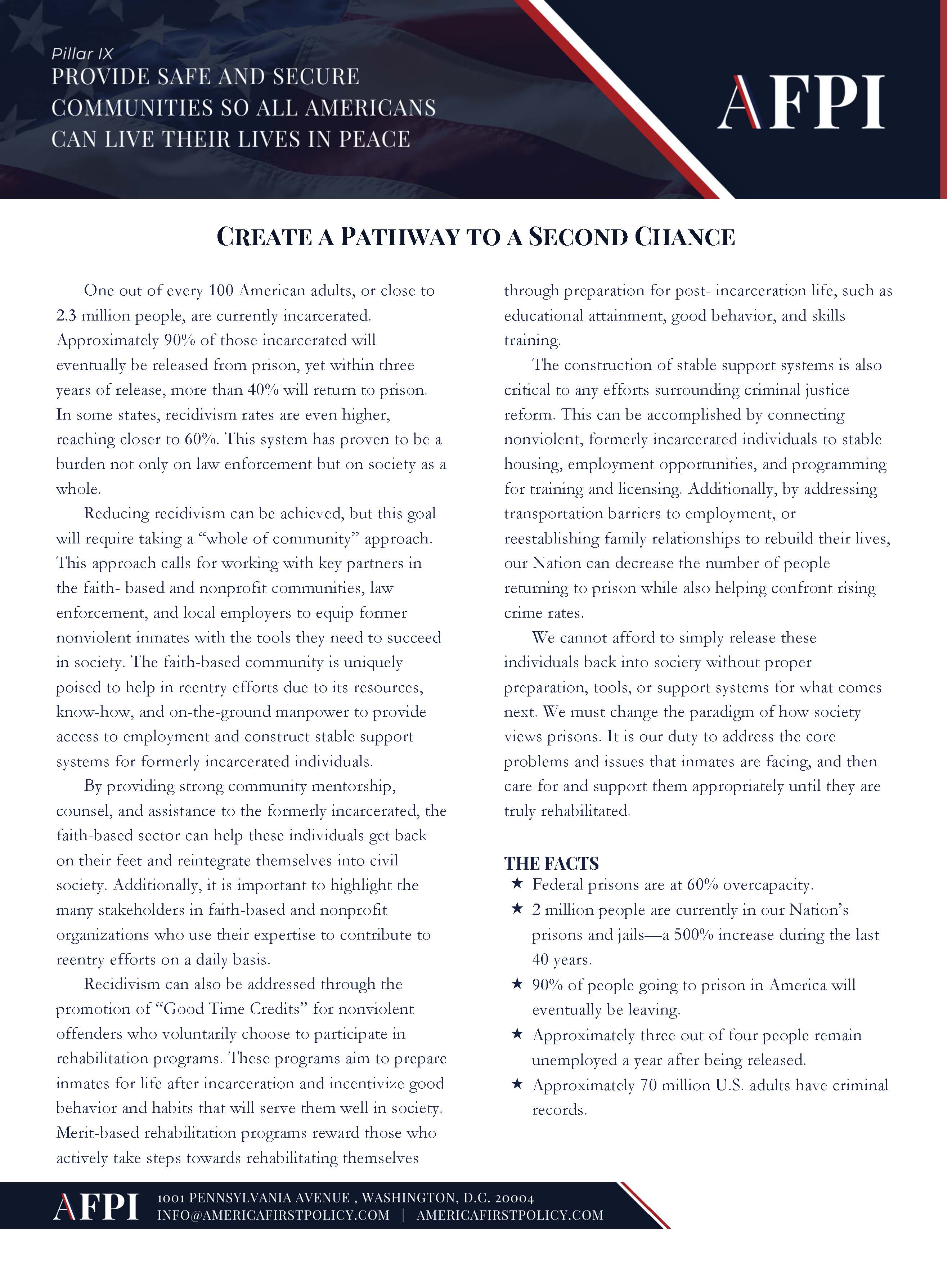Pillar IX: Provide Safe and Secure Communities so All Americans Can Live Their Lives in Peace
Create a Pathway to a Second Chance
One out of every 100 American adults, or close to 2.3 million people, are currently incarcerated. Approximately 90% of those incarcerated will eventually be released from prison, yet within three years of release, more than 40% will return to prison. In some states, recidivism rates are even higher, reaching closer to 60%. This system has proven to be a burden not only on law enforcement but on society as a whole. Reducing recidivism can be achieved, but this goal will require taking a “whole of community” approach.
This approach calls for working with key partners in the faith- based and nonprofit communities, law enforcement, and local employers to equip former nonviolent inmates with the tools they need to succeed in society. The faith-based community is uniquely poised to help in reentry efforts due to its resources, know-how, and on-the-ground manpower to provide access to employment and construct stable support systems for formerly incarcerated individuals.
By providing strong community mentorship, counsel, and assistance to the formerly incarcerated, the faith-based sector can help these individuals get back on their feet and reintegrate themselves into civil society. Additionally, it is important to highlight the many stakeholders in faith-based and nonprofit organizations who use their expertise to contribute to reentry efforts on a daily basis.
Recidivism can also be addressed through the promotion of “Good Time Credits” for nonviolent offenders who voluntarily choose to participate in rehabilitation programs. These programs aim to prepare inmates for life after incarceration and incentivize good behavior and habits that will serve them well in society. Merit-based rehabilitation programs reward those who actively take steps towards rehabilitating themselves through preparation for post- incarceration life, such as educational attainment, good behavior, and skills training.
The construction of stable support systems is also critical to any efforts surrounding criminal justice reform. This can be accomplished by connecting nonviolent, formerly incarcerated individuals to stable housing, employment opportunities, and programming for training and licensing. Additionally, by addressing transportation barriers to employment, or reestablishing family relationships to rebuild their lives, our Nation can decrease the number of people returning to prison while also helping confront rising crime rates.
We cannot afford to simply release these individuals back into society without proper preparation, tools, or support systems for what comes next. We must change the paradigm of how society views prisons. It is our duty to address the core problems and issues that inmates are facing, and then care for and support them appropriately until they are truly rehabilitated.
THE FACTS
- Federal prisons are at 60% overcapacity.
- 2 million people are currently in our Nation’s prisons and jails—a 500% increase during the last 40 years.
- 90% of people going to prison in America will eventually be leaving.
- Approximately three out of four people remain unemployed a year after being released.
- Approximately 70 million U.S. adults have criminal records.
THE AMERICA FIRST AGENDA
At the federal level, support policies that:
- Reform means-testing criteria in government assistance programs to not penalize two-parent homes, such as those without housing assistance and food stamp programs, thereby encouraging more stable family environments.
- Prioritize mechanisms for reentry to society that include a focus on rehabilitation efforts prior to parole.
- Facilitate pathways to a second chance, such as reducing barriers and disincentives to occupational training and licensing, and engage the private and nonprofit sectors in expanding access to halfway homes, transportation, and employment, and supporting reentry programming.
- Highlight the successful faith-based and nonprofit stakeholders in prison reentry efforts around the country.
At the state level, support policies that:
- Create merit-based rehabilitation programs for nonviolent offenders within our government-funded prisons that provide educational and workforce parole credits at the state level.
- Prioritize mechanisms for reentry to society that include a focus on rehabilitation efforts prior to parole.
- Encourage additional tax incentives for those providing pathways to a second chance. These pathways include occupational training and licensing, halfway homes, transportation, employment, and reentry programs.
- Highlight the successful faith-based and nonprofit stakeholders in prison reentry efforts around the country.
REFERENCES
Criminal Justice Facts, The Sentencing Project (2022).
Op-Ed: Woke Criminal Justice Reform Advocates Fail Inmates, Communities by Jack Brewer, America First Policy Institute (Aug. 2021).
Right on Crime, Texas Public Policy Foundation (2022).
